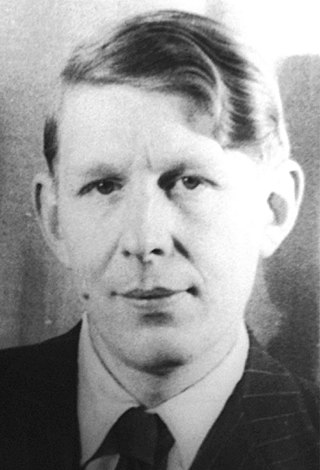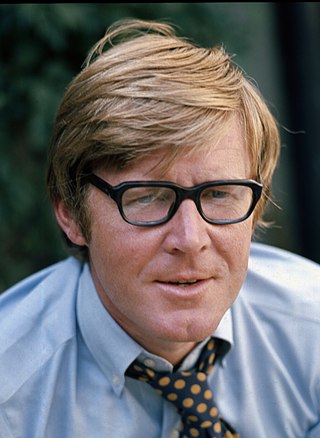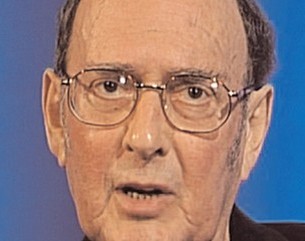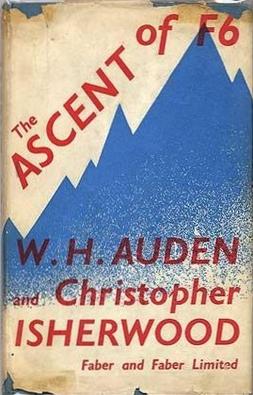Related Research Articles

Wystan Hugh Auden was a British-American poet. Auden's poetry is noted for its stylistic and technical achievement, its engagement with politics, morals, love, and religion, and its variety in tone, form, and content. Some of his best known poems are about love, such as "Funeral Blues"; on political and social themes, such as "September 1, 1939" and "The Shield of Achilles"; on cultural and psychological themes, such as The Age of Anxiety; and on religious themes, such as "For the Time Being" and "Horae Canonicae".

Edward Benjamin Britten, Baron Britten was an English composer, conductor, and pianist. He was a central figure of 20th-century British music, with a range of works including opera, other vocal music, orchestral and chamber pieces. His best-known works include the opera Peter Grimes (1945), the War Requiem (1962) and the orchestral showpiece The Young Person's Guide to the Orchestra (1945).

Alan Bennett is an English playwright, author, actor and screenwriter. Over his entertainment career he has received numerous awards and honours including two BAFTA Awards, four Laurence Olivier Awards, and two Tony Awards. He also earned an Academy Award nomination for his film The Madness of King George (1994). In 2005 he received the Society of London Theatre Special Award.

Harold Pinter was a British playwright, screenwriter, director and actor. A Nobel Prize winner, Pinter was one of the most influential modern British dramatists with a writing career that spanned more than 50 years. His best-known plays include The Birthday Party (1957), The Homecoming (1964) and Betrayal (1978), each of which he adapted for the screen. His screenplay adaptations of others' works include The Servant (1963), The Go-Between (1971), The French Lieutenant's Woman (1981), The Trial (1993) and Sleuth (2007). He also directed or acted in radio, stage, television and film productions of his own and others' works.

Samuel Alexander Joseph West is an English actor, theatre director and narrator. He has directed on stage and radio, and worked as an actor in theatre, film, television, and radio. He was nominated for the BAFTA Award for Best Actor in a Supporting Role for his portrayal of Leonard Bast in the Merchant Ivory film adaptation of E. M. Forster's novel Howards End (1992), and was later nominated for the Genie Award for Best Performance by an Actor in a Leading Role for his portrayal of the title role in Rupert's Land (1998). In 2010, he was nominated for the Laurence Olivier Award for Best Actor for his portrayal of Jeffrey Skilling in Lucy Prebble's Enron. He has appeared as reciter with orchestras and performed at the Last Night of the Proms in 2002. He has narrated several documentary series, including five for the BBC about the Second World War.

Sir Michael John Gambon was an Irish-English actor. Gambon started his acting career with Laurence Olivier as one of the original members of the Royal National Theatre. Over his six-decade-long career, he received three Olivier Awards and four BAFTA TV Awards. In 1998, he was knighted by Queen Elizabeth II for services to drama.

Simon James Holliday Gray was an English playwright and memoirist who also had a career as a university lecturer in English literature at Queen Mary, University of London, for 20 years. While teaching at Queen Mary, Gray began his writing career as a novelist in 1963 and, during the next 45 years, in addition to five published novels, wrote 40 original stage plays, screenplays, and screen adaptations of his own and others' works for stage, film and television and became well known for the self-deprecating wit characteristic of several volumes of memoirs or diaries.
No Man's Land is a play by Harold Pinter written in 1974 and first produced and published in 1975. Its original production was at the Old Vic theatre in London by the National Theatre on 23 April 1975, and it later transferred to Wyndham's Theatre, July 1975 – January 1976, the Lyttelton Theatre April–May 1976, and New York's Longacre Theatre from October–December 1976. It returned to the Lyttelton from January – February 1977. It is a two-act play.

The Coast of Utopia is a 2002 trilogy of plays: Voyage, Shipwreck, and Salvage, written by Tom Stoppard with focus on the philosophical debates in pre-revolution Russia between 1833 and 1866. It was the recipient of the 2007 Tony Award for Best Play. The title comes from a chapter in Avrahm Yarmolinsky's book Road to Revolution: A Century of Russian Radicalism (1959).

Richard Thomas Griffiths was an English actor of film, television, and stage. He was known for his portrayals of Vernon Dursley in the Harry Potter films (2001–2010), Uncle Monty in Withnail and I (1987), and Henry Crabbe in Pie in the Sky (1994–1997). Over his career he received numerous accolades including a Tony Award and Olivier Award as well as a nomination for a BAFTA Award. He was appointed an Officer of the Order of the British Empire (OBE) by Queen Elizabeth II in 2008.
John Slade Nettleton was an English actor best known for playing Sir Arnold Robinson, Cabinet Secretary in Yes Minister (1980–1984) and President of the Campaign for Freedom of Information in the follow-up Yes, Prime Minister (1985–1988). Another political role for Nettleton was as Conservative Party MP Sir Stephen Baxter in the sitcom The New Statesman.

The History Boys is a play by British playwright Alan Bennett. The play premiered at the Royal National Theatre in London on 18 May 2004. Its Broadway debut was on 23 April 2006 at the Broadhurst Theatre where 185 performances were staged before it closed on 1 October 2006.

Betrayal is a play written by Harold Pinter in 1978. Critically regarded as one of the English playwright's major dramatic works, it features his characteristically economical dialogue, characters' hidden emotions and veiled motivations, and their self-absorbed competitive one-upmanship, face-saving, dishonesty, and (self-)deceptions.
"Funeral Blues", or "Stop all the clocks", is a poem by W. H. Auden which first appeared in the 1936 play The Ascent of F6. Auden substantially rewrote the poem several years later as a cabaret song for the singer Hedli Anderson. Both versions were set to music by the composer Benjamin Britten. The second version was first published in 1938 and was titled "Funeral Blues" in Auden's 1940 Another Time. The poem experienced renewed popularity after being read in the film Four Weddings and a Funeral (1994), which also led to increased attention on Auden's other work. It has since been cited as one of the most popular modern poems in the United Kingdom.

Michael Keith Billington is a British author and arts critic. He writes for The Guardian, and was the paper's chief drama critic from 1971 to 2019. Billington is "Britain's longest-serving theatre critic" and the author of biographical and critical studies relating to British theatre and the arts. He is the authorised biographer of the playwright Harold Pinter (1930–2008).
The Group Theatre (London) was an experimental theatre company founded in 1932 by Rupert Doone and Robert Medley. It evolved from a play-reading group in Cambridge that Doone had been involved with during his years studying with the Cambridge Festival Theatre. The Group Theatre was active from 1932 to 1939 and reformed as The Group Theatre Ltd. in the early 1950s.

The Ascent of F6: A Tragedy in Two Acts, by W. H. Auden and Christopher Isherwood, was the second and most successful play in the Auden-Isherwood collaboration, first published in 1936. It was a major contribution to English poetic drama in the 1930s. It has been seen as a parable about will, leadership and the nature of power: matters of increasing concern in Europe as that decade progressed.
"The Sea and the Mirror: A Commentary on Shakespeare's The Tempest" is a long poem by W. H. Auden, written 1942–44, and first published in 1944. Auden regarded the work as "my Ars Poetica, in the same way I believe The Tempest to have been Shakespeare's."
Habeas Corpus is a stage comedy in two acts by the English author Alan Bennett. It was first performed at the Lyric Theatre in London on 10 May 1973, with Alec Guinness in the central role. It ran, with cast changes, until 10 August 1974. The Broadway production that followed was less successful, running for less than three months. The play has been revived several times since then, in London and elsewhere.
The 2010 Evening Standard Theatre Awards were announced on 29 November 2010. The shortlist was revealed on 22 November 2010 and the longlist on 25 October 2010.
References
- ↑ "Richard Griffiths Replaces Michael Gambon in Bennett's 'Habit of Art' in London", Playbill
- 1 2 The Habit of Art, programme, The National Theatre, 2009
- 1 2 The Habit of Art, programme, The Original Theatre Company, York Theatre Royal and Ghost Light Theatre Productions, 2018
- ↑ Bennett, Alan (2009). The Habit of Art. London: Faber and Faber. ISBN 9780571255610.
- 1 2 3 "The Habit of Art - The Guardian". TheGuardian.com . 18 November 2009. Retrieved 3 February 2019.
- 1 2 "The Habit of Art - Telegraph" . Retrieved 3 February 2019.
- 1 2 3 "The Habit of Art - LondonTheatre". 8 June 2016. Retrieved 3 February 2019.
- ↑ "The Habit of Art - New Statesman" . Retrieved 3 February 2019.